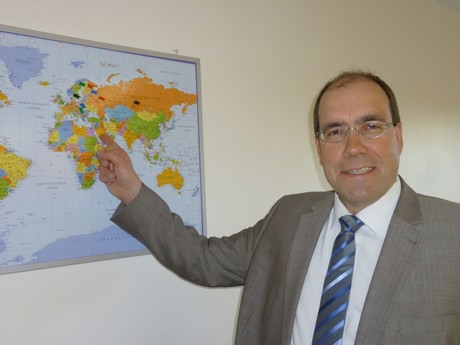
F. L. Frank Döscher, CEO of the Elbe-Obst Vertriebsgesellschaft mbH, and Gert Hauschildt, chair of the board of directors of the Elbe-Obst Vertriebs und bondholder of Hauschildts Obsthof Handels GmbH & Co. KG from the Altes Land.
FreshPlaza: The state office for statistics has predicted a below average apple harvest in its current harvest prognosis. How is it looking at Elbe-Obst and its partners?
Frank Döscher: “I can underscore this prognosis. Of course, things are not looking different with Elbe-Obst. In this campaign we are expecting around 150,000 tonnes of apples. Last year we had a harvest of around 200,000 tonnes.”
Gert Hauschildt: “Of course, one has to see the predicted deficit of 30 percent in comparison to last year. But last year we had a record harvest. Compared to the long-term average value, it involves a deficit of around 15 percent.”
FP: How do matters stand regarding the start of the season in the Altes Land?
Döscher: “We are currently banking on a delayed season start – of circa one to two weeks. In the end however, it will likely be two. From calendar week 37 or 38 onward the apple harvest will likely kick off. From mid-September onward we will first begin with the first Holsteiner Cox, then comes type Elstar and one and a half weeks later the harvest of the Jonagold group will begin.“
FP: Will the yield of the earlier or later kinds be different from the previous year?
Hauschildt: “Last year we had the problem that our harvest quantities were so enormous, that we had to leave some varieties hanging on the trees for a relatively long time. For example with later varieties such as Jonagold. This has strained the trees, and that is why these varieties bear somewhat less fruit this year. However, with the early varieties, such as Holsteiner Cox or Elstar, we are counting on an almost full harvest yield.”
FP: What do your prognoses say with regard to the quality and size of the fruits?
Hauschildt: “Because of the later harvest, we are not banking on outsizes this season. We are banking on a relatively steady growth. Contrary to the south, we have good blooming weather, because the rain began timely in July. When one has water this season, the fruits grow 3 millimetres per week instead of 2, and in the end one has a harvest of around 10 percent higher, just because of the size of the fruits. “
Döscher:”We can say that we have ideal weather and a good fruit growth. But the last four weeks can still have a critical influence on the harvest. Therefore it is only a snapshot. But the ideal basic prerequisites put us in a good starting position. We have few problems with hail, fungus infestation, pests or other outside influences. “
FP: How are matters standing for the current mood on the market?
Döscher: “When one compares the mood on the market with the situation of a year ago, the mood has lightened up a bit throughout Europe. A year ago, the mood was very negative because of the embargoes which were imposed by Russia at the time. Although the embargo is still active today, new target markets are also being opened up. Furthermore, the apples for processing will have a better season start. In this we can most likely achieve better prices than last year - back then, subterranean prices of two to five cents per kilo were the rule. In this campaign we are counting on being able to achieve substantially better prices
Hausschildt: “The development on the market is of course very positive. But from the perspective of the producers, one must also be aware that we have an increase in costs of around four percent per kilo due to the minimum wage. Due to the prices of the past year, many producers have already gotten into trouble. When one has two to three years like this, many companies will cease to exist.”

FP: How is it with competition from overseas?
Döscher: The competition from overseas was very manageable during the last campaign. Price wise, import apples did not have a great appeal. Due to the record harvest in Europe, we temporarily had an excess on the market, which kept prices low. In addition came the exchange rate problems between the dollar and the Euro. Because of this, the European market was not very interesting to the competition.”
FP: How do you think the season will go?
Döscher: That is hard to say of course. But if the situation stays the way it is currently, then we can count on a good season for the producers and marketers in the Altes Land.
Frank Döscher
Elbe-Obst Vertriebsgesellschaft mbH

Bassenflether Chaussee 4b, 21723 Hollern Twielenfleth
Tel. +49 (0)4141 9531 854
[email protected]
www.elbe-obst.com
Gert Hauschildt
Hauschildts Obsthof Handels GmbH & Co. KG
Bliedersdorfer Weg 3, 21640 Nottensdorf
Tel.+49 (0)4163 808131
[email protected]
www.hauschildts-obsthof.de










